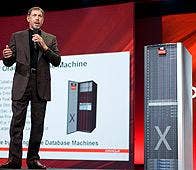Oracle, With HP, Debuts Database Server, Storage Hardware Systems
CEO Larry Ellison Wednesday unveiled two hardware systems, an advanced database server and a programmable storage server, co-developed with Hewlett-Packard, that will make Oracle a player in the computer hardware market.
Ellison, in his Oracle OpenWorld keynote speech, said the systems solve the problem of moving increasingly huge volumes of data from ever larger data storage arrays to database servers.

The HP Oracle Database Machine and the HP Oracle Exadata Programmable Storage Server are being manufactured by HP. Oracle will be responsible for sales and system support for the products while HP will be responsible for hardware delivery and hardware service, Oracle said.
The move will put Oracle into direct competition with data warehouse hardware/software system vendors such as Teradata and Netezza.
Ellison said the Oracle Database Machine would provide a ten-fold performance improvement over data warehouses using current Oracle technology. Although Oracle is targeting that new product toward large-scale data warehouse applications, Ellison said it would improve the performance of high-volume transaction processing systems as well.
"Information has proliferated at an astonishing rate. There's a huge data bandwidth problem," Ellison said, introducing the new systems with his usual dramatic flair, accentuated with thunder and lightning-like special effects. "Today's disk storage systems can store data, but they can't move the data to processors fast enough."
Data transfer rates begin to slow down as databases exceed 1 terabyte in size, Ellison said, "and even the fastest systems slow to a halt at 10 terabytes. To try to solve the problem, we had to go beyond just software."
Ellison, returning to his roots as a programmer, said today's interconnect technology between storage systems and database servers has become a choke point for IT systems. Storage arrays respond to database requests by sending entire blocks of data from disk drives to database servers. The database then searches through that data to find the specific information that's needed
The HP Oracle Exadata Programmable Storage Server tackles that problem by placing Intel multi-core microprocessors next to each disk drive. The processors search each drive in parallel in response to queries for requested data and sends only the needed information.
"That (microprocessor) intelligence allows us to reduce the amount of data that flows back and forth," Ellison said. "We've taken a tremendous burden off the interconnect."
The HP Oracle Exadata Programmable Storage Server is being sold as a separate product for boosting the performance of existing database systems. But it's also a component of the HP Oracle Database Machine. Each Exadata system uses a massively parallel architecture with two, four-core microprocessors, up to 12 TBytes of data storage capacity and InfiniBand connectivity with 1 GByte/second of data bandwidth per storage server.
Oracle said the Exadata systems improve data-intensive query processing performance by a factor of 10.
The HP Oracle Database Machine is made up of a grid of eight database servers with 64 Intel processor cores and a grid of 14 Exadata servers with up to 168 Terabytes of combined data storage capacity and 14 Gbps data bandwidth. The system is pre-configured for Oracle Business Intelligence Enterprise Edition tools and Oracle Real Application Clusters clustering technology.
Ellison showed a number of slides favorably comparing the HP Oracle Database Machine's performance and operating costs to competing products from Teradata and Netezza, as well as slides showing the results of test runs of the system at customer sites. But then he answered what he called the burning question. "It holds a really lot of songs," he said to the audience's laughter, saying it has a capacity "1,400" times that of Apple's biggest iPod.
"We're doing what our two companies do best," said HP CEO and president Mark Hurd, who appeared via a live video link.
Competitors were quick to respond. "For years the old, incumbent vendors have tried to bolt together their products to try and tackle the data warehouse appliance market " and every one was a failure," said Jim Baum, president and COO of Netezza in a statement.
"You just can't slap together existing solutions in clever packaging and expect to deliver much faster performance," Baum added. "The power and simplicity of the data warehouse appliance model lies in integration and design from the ground up. Engineers in the same company, the same building, working to integrate a shared vision " not patch it together with glue and spit."
The HP Oracle Exadata Programmable Storage Server is available today. The HP Oracle Database Machine is available now for Oracle Linux-based database systems with versions for other operating systems to come.